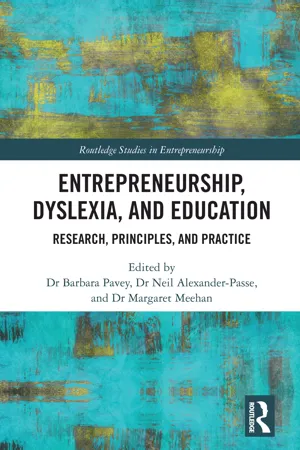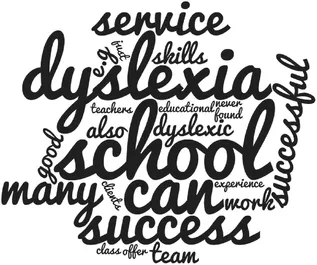Introduction
Over the last 20 years there has been a rise in awareness that dyslexia can bring both advantages and abilities as well as difficulties in a society that relies heavily on literacy and numeracy skills (West, 1997). The role of entrepreneurs who experience dyslexia has been spearheaded by Julie Logan with her work investigating both British and North American entrepreneurs. Other researchers have also investigated successful people with dyslexia (Gerber, Ginsberg, & Reiff, 1992; Goldberg, Higgins, Raskind, & Herman, 2003), and this study aims to build on such studies.
Empirical evidence suggests that growing up with dyslexia in mainstream education can be traumatic, especially in the 1970s and 1980s in the UK, where dyslexia and Special Educational Needs (SEN) were still in their infancy regarding understanding in schools. The lack of awareness in teachers (both then and more recently) has been found to cause low self-esteem and low self-confidence; individuals believed the labels of ‘stupid’ or ‘lazy’ that were given to them by teachers, peers and, at times, family. Such feelings have long-lasting manifestations which can be related to Post-Traumatic Stress Disorder (PTSD) according to Alexander-Passe (2015a, 2016).
However, whilst many individuals with dyslexia leave school feeling worthless with few paper qualifications to their name, fortunately many do not. Others, as indicated in this literature review, have been able to use their school trauma positively, to not only gain employment, but to succeed in the workplace. Some have also chosen to become self-employed and entrepreneurs, which not only demonstrates their strengths, skills and abilities, but offers unique services which (neuro-typical) individuals had never thought of. Entrepreneurs such as Sir Richard Branson and Sir James Dyson are two such examples where despite their dyslexia difficulties, they have created billion-dollar companies that are not only innovative but have reshaped their sector (airlines, music, and engineering and electrical products). The advantages of self-employment include the ability to concentrate on strengths (e.g. selling and creating) and to delegate areas of weakness to others (e.g. administration), which can be impossible when working in large organisations, especially where the employer struggles with the concept of dyslexia and how to support such individuals.
This chapter aims to develop this entrepreneurship theme by interviewing Sharon Hewitt, an award-winning entrepreneur with dyslexia who has redefined the property buying experience. It also looks at gender as a factor in Sharon’s success and how she struggled to not only cope with her dyslexia and working in a male-orientated environment, but also to challenge gender stereotypes so that she could do more than take the expected role of a housewife, becoming an entrepreneur who brought an innovative approach to her chosen industry sector.
At secondary school I was taken into a class for special lessons.
I was assessed for two hours at school (with tests in e.g. reading out loud, completing forms, reading comprehension, and mathematic skills). This assessment was probably by a specialist teacher; after many tests, I was told I was dyslexic. I have no paperwork to support my diagnosis as a child.
Although Sharon does not believe she has been formally diagnosed with dyslexia, she is aware that the term was used when she was at school and that she received additional or special educational lessons. The two-hour assessment, which is still a strong memory in her mind, indicates more than a basic assessment, with both oral and written abilities tested.
Childhood (Home Life)
I define my father as clearly dyslexic, but it was never discussed at home. He never wrote a word, he was a precision engineer, and learnt by watching. He would not even write on my mother’s birthday card, he would give her a blank birthday card as he was afraid he would get her name wrong, and upset her. Apart from his signature, he would never write a thing in his life. Now you look back it’s clear to say he was clearly dyslexic. My mother would just fill in the gaps where needed, when he needed to do things/write things and he signed it.
There seems to be a clear hereditary nature to Sharon’s dyslexia, as her father had similar, if not more severe, symptoms of dyslexia. He developed advanced ‘avoidance’ coping strategies, not only with regard to the outside world but also with his own family and spouse. It would be fascinating to talk to Sharon’s mother to understand at what point she was aware of his severe literacy difficulties. Sharon suggests her father’s illiteracy was never discussed at home; however, it seemed clear that all their children demonstrated varying difficulties with reading and writing. Interestingly, only Sharon gained an assessment/diagnosis at school. The term ‘we all just muddled through’ is reflective of schooling in the 1960s to the 1980s where Special Educational Needs (SEN) were not discussed, were dismissed or were ignored.
The introduction of the UK Education Act of 1970 (Handicapped Children) led to The Warnock Report (Warnock, 1978), beginning our modern understanding of ‘SEN’ where the crucial figure 20% of young people was estimated to experience learning difficulties at least at some point in their educational career. The Warnock Report aimed to highlight that young people were struggling at school and that new inclusive education provision/legislation was needed, and future education acts have moved schools both physically (e.g. the need for wheelchair accessible toilets and classrooms) and academically (e.g. every class teacher is a teacher of SEN).
School (Primary)
It was immediately said when I started primary school ‘that Sharon was not trying hard enough’. The reports would say ‘if she worked harder, listened more’. The homework, I would work really hard but I would get red lines through it all. I would hand it in and I was told I had made no effort, I hadn’t listened. It’s all spelt wrong, you are not even copying correctly from the board into your text book. I could never do it quick enough, I could not spell it well enough and it looked messy and scruffy, and they just told me I was ‘lazy’ and that was like a lot of my primary schooling.
My writing was very small and scruffy as I thought if I write small they can’t see if it’s mis-spelt, and I just felt I was letting everyone down. The teachers thought I was just lazy; my mother was asking me ‘why aren’t you trying’? But I was trying really hard.
Primary school is often where many learners with dyslexia (and unidentified learners who experience dyslexia) first find out that they are different. Young people with dyslexia find that they can’t do things and are often moved to the table with others that struggle, whilst others progress faster in class and gain praise and respect; causing a ‘them and us’ positioning, first in the classroom and then in the playground with social groups formation. The young learner who experiences dyslexia soon thinks of themselves as ‘lazy and stupid’ and this affects their ability to try and risk new learning in class, believing themselves to be second class citizens (as previously found in Alexander-Passe, 2010).
No matter how much Sharon tried, she felt ill-equipped to be at school and fell quickly into the same pattern. ‘I felt I was letting everyone down’ indicates that her self-esteem was at rock-bottom and her mother and teachers were lost as to knowing what to do.
School (Secondary)
Subjects I was good at? Languages were a nightmare for me. I was interested in using commas in my writing, and geography. Not great at maths. Not great at catching ball, hand eye co-ordination.
Friendship wise, I had a core group, it was a group of the outcasts. I would stick up for the ones being bullied. We were part of the odd crowd.
Did I feel stupid? That word!
I had from teachers ‘Sharon, you are so good verbally, you get what we are saying, you get our questions right, but when I see your homework it is like you hadn’t listened. Why can you answer the questions in class and we think you understand it’. This written work is appalling I would say ‘I just don’t know why I can’t do it, I just don’t understand’ and that was frustrating.
At secondary school Sharon suggests that there was a distinct difference between her oral and written work in class, with teachers even asking her why she was so good orally but unable to produce the same high results on paper. However, knowledge of dyslexia/learning difficulties was very poor then and no one referred her for further investigation.
Sharon recognised that school was an unfair environment to be in, with her peers and friends seemingly able to do what was being asked of them but sadly she could not. Even when she felt she was doing well and was moved to a higher ability class, she was quickly moved down again, which was a ‘humiliating’ experience and reinforced her low self-worth in her own eyes and that of her peers. When questioned about whether she felt ‘stupid,’ her reaction to this word had strong ramifications and she has now vowed to never use that word to her own children due to the traumatic effect it had on herself.
Initial Post-School Career
When it came to career guidance. This guy would just look at my qualification I had previous and said ‘if I work really hard you could be a shop assistant in Boots’ and that is okay to be a shop assistant, but if that was my goal to aim for, that was dreadful. There was more to me than working in a shop, why should that be it for me?
I found I was really good with the customers, so began to spend more time with them than on reception. When someone complained to the boss he then said ‘get someone in to do the receptionist job, I want Sharon with the sales team’. I then moved myself up to be the first female branch/ area manager in the business.
Career guidance was very disappointing to Sharon, as they only looked at written abilities and ignored her strong verbal skills. She was not allowed to take O Levels and left school with few qualifications to her name—not enough to go to 6th form to study for A Levels for university entrance. College however was a possibility, starting at a very low level course. Of her family, none of them went to college and all left school at 16 years old for the workplace. Sharon’s mother didn’t think that she had much potential and thought that having a basic job (e.g. a cleaner) and being a housewife was all she was capable of.
Sharon was fortunate to gain an au pair position with a family, where she could demonstrate her many abilities without literacy being an impairment. When she wished to leave, she was offered a reception...

